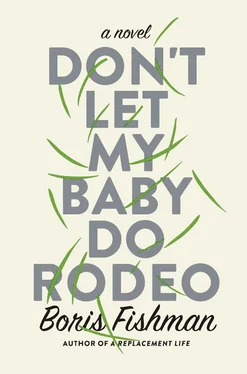Maya was about to start, but Bender cut her off. “I do not care what the parents think,” he waved his hand. “I care what the child thinks. How about you switch places with the boy? Just wait outside. Bella can give you coffee, or there is a deli just a quarter mile down the road. Come back in”—he checked his watch—“thirty-five minutes.” He looked up at Alex, who fought heat in his face.
“What are we supposed to tell him?” Alex said. “We thought you would discuss it with us. We said we are going to the doctor because his mother has an appointment.”
“Oh, yes?” Bender smiled with pity. “Perhaps, indeed, we should begin with the parents. But when the stove is broken, you start with the stove. Then you can check the gas lines.” He fell back in his chair to allow this observation to settle on the Rubins. “You are not professionals,” he went on, “but you haven’t helped with this deception. Now the boy will feel tricked.” He shot his cuffs, gathered his hands into a steeple, and laid his elbows on the edge of his desk. “Let’s work with what we’ve got. You made white black, let’s not make it white all over again. I’ll tell him that I’ve spoken to his mother, and now I’d like to speak to him, because maybe he can tell me something that’ll help. Does he remember me?” Bender said.
“We speak about you all the time,” Maya lied.
Maya dreaded explaining to Max that Bender wanted to speak to him, but even before the psychologist came bounding out after the Rubins, the boy put down the magazine in his hands and obediently slid off his chair, as if accepting a punishment.
The parents watched Bender’s door close. Maya’s heart tumbled. Was she doing damage? No, they had to try. What damage could a half hour with that man do? Bender, at least, seemed confident of improvement. And who knew? Her boy might walk out of the room changed; isn’t that what psychologists specialized in? She was cornering herself with worry so she could remember that things might, after all, turn out more positively. She wondered if she rang an alarm merely to feel relief at its falseness.
Maya tried to occupy herself by flipping through Bender’s book. Bender, who seemed disapproving of so much, turned out to also contain great enthusiasms, which he allowed to pour forth within the privacy of two covers. An immigrant at the not-very-old but no-longer-so-young age of thirtysomething, Bender had been driven by immigration and a motherly wife into a responsible vocation, setting, and lifestyle. But within burned a performer, a wit, an irregular mind. “Hello, my dear fellow Americans!” his preface began. “Russians have come! Being a psychologist I had paid attention to your American psychotherapy, of course. And so many thoughts and feelings came to my mind! Once a youthful poet from one good old Russian movie said: ‘Happiness — it is when you are understood.’ And I have a strong desire to share with you my thoughts and feelings. Reading textbooks is useful, but it is boring, I will tell you. But trying to help myself and other people to adapt to your country, I wrote my book, where the rules of psychology are expressed on the basis of the examples from life, literature, and art.”
Maya flipped the pages to see if Bender had culled any lessons from family life, but despaired to see, after the dedication — a quote about trees and flowering out that Bender had scrawled in a Soviet person’s unmistakable hand, at once florid and cramped — no such subject included in the table of contents: I. What Does Classical Russian Literature Tell Us About American Psychotherapy? “What Does Classical Russian Literature Tell Us About American Psychotherapy?” II. Psychological Sketches from the Lives of Famous People “What Does Classical Russian Literature Tell Us About American Psychotherapy?” III. Meeting Interesting People “What Does Classical Russian Literature Tell Us About American Psychotherapy?” IV. Special Topics “What Does Classical Russian Literature Tell Us About American Psychotherapy?” a. Cultural Shock b. Homosexuals
Desolately, Maya flipped back to the preface. There she was heartened to read Bender’s observation that family issues did not receive a separate section because you couldn’t get very far in any of the listed subjects without touching on family. “There is no life without family — just as there is no malady without family,” Bender observed tartly. This set him off on a wistful recollection of Tolstoy’s eternal maxim about unhappy families from Anna Karenina , an elegant transition to the first section. Maya flipped closed the book. What explained the universe’s obsession with this novel? She had cracked its stiff cardboard spine at last in tenth grade with an excitement exceeding her first sexual congress (which had taken place not many months before). What followed described the sexual congress as well: confusion and then disappointment. Why would a woman like Karenina fall in love with a man like Vronsky? He was handsome, apparently, though Tolstoy did not make him transcendently so; other than that, it wasn’t clear what he had in his favor. And Maya had heard the phrase “a woman like Karenina” many times before she wondered what was so special about Karenina herself, her endless mooning and splashing of hands. The whole setup felt provincial, long-winded, tiresome.
She looked at Alex, but he had closed his eyes and leaned his head against the wall. She opened the book once again. Here and there, Bender’s discussion was leavened by lovely turns of phrase of which she had not imagined the therapist capable. “The husband and wife are the long conversation,” she saw on one page. On another, he referred to immigration as the “cold shower of a new life.” In the celebrity section, which turned out to be a section on celebrity scandals, Bender dispensed with Bill Clinton’s indiscretions in one sentence—“I did not vote for him”—before settling into the subject that truly held him: the Kennedys. And it was here that Maya began to glimpse the logic behind the approach Bender was, quite possibly, employing on her son at that very moment. For Bender, the Kennedy curse was nothing more mysterious than a series of sons buckling under the obligation to live up to their forefathers. “It often happens in families,” Maya read with a chill, “where children are passively and obediently doing what their parents want without their own understanding.” To think, stamp-sized JFK Jr. saluting his father’s coffin with a stoic expression because Jackie O had explained that Kennedys don’t cry! “Perhaps it would have been better if he had cried!” Bender shrieked uselessly into the abyss of the young martyr’s memory. “He even did not want to take his last fatal flight,” Bender insisted, pointing out that the young Übermensch was an Untermensch pilot. “His wife wanted that,” the section’s last line tolled like the bell of a graveyard. Maya saw Bender shaking his head as he walked off the stage.
Was Max obeying his parents against his will? (And what did his will want? to eat grass?) Maya was not heartened by this theory, but she was lifted, at least, by the arrival of some theory. Until this emergency circumstance, the Rubins — and now Maya counted herself among them — had regarded psychology as the province of lunatics and emotional diddlers, but in actuality it seemed full of ideas, and relatively normal human beings trying to arrive at answers to formidable questions. Maya felt a new fondness for Bender. However, this impression was dispelled by the author’s presentation of another case study, involving a young man only a handful of years older than Max — Sam. Sam’s problem was that he had not asked to be brought to America , but had been, at an impressionable age, and the shocking unfamiliarity of what he encountered, coupled with his voicelessness in the matter, spurred him into a violent seesaw between quasi-autistic withdrawal into Russian books and music (increasingly dark) and bouts of rage and destruction of American property. Until he sat down for a talk with psychologist Bender.
Читать дальше












